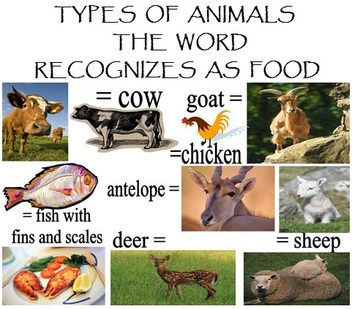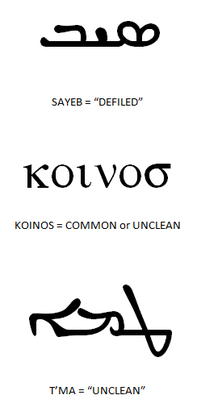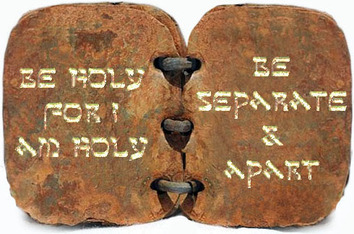T H E F A I T H - B A S E D
F O O D I E
by Jeremy Chance Springfield
Scripture has quite a mouthful to say about food. When it comes to portions entertaining the topic of edibles, it doesn’t skimp on any serving. In its pages we are promised a lush land freely flowing with milk and honey. The Messiah’s first recorded miracle so marvelously morphed water into wonderful wine. Whether it be describing the flame-seared sacrifices upon the altar for worship and the requirements of such recipes in the lengthy lines of Leviticus, or the salaciously spicy similes of the two hungry lovers in the Song of Songs, Scripture runs the gustatory gamut in a way that should be taken note of by faithful foodies of all flavors.
Although food is not the main course of the Word, to be sure, it certainly has a commanding presence in His Holy Book. One doesn’t get too far into the opening pages before the allure of eating the fruits of the earth confronts mankind in a life-changing manner. He has thus ordered the contents of His Word in such a fashion that we cannot put off the palatable position of food in its pages. After all, are we not told to “taste and see” how good is our Holy One?
When it comes to dishing about what we can eat, Scripture doesn’t mince words on the topic. The menu is set, and there are no substitutions. If you are vegan or vegetarian, you have just a simple rule to follow when it comes to your food:

- All your fruits and veggies have to be seed-bearing, as per Genesis 1:29.
The only time you could ever be absolutely required in Scripture to eat meat would be if you were in Jerusalem at the yearly Passover, where it is incumbent upon all the faithful to partake of roasted lamb, regardless of what particular diet discipline you maintain at other times. If the Temple sacrificial system were in operation, certain animal offerings also require the eating of a portion of the meat. Other than that, eating meat is not mandated on the Most High's menu. This is the barest minimum of rules to keeping a Scripturally-valid diet.

But what if subsisting on salads, glutting on greens, and pledging fealty to feasting on fruit alone is not your cup of Chai tea? (Did you see what I did there at the end – that was brilliant, folks) What if your food includes things that don’t just grow from roots, but have the capacity to think, move, and in some cases are even considered as pets? What about the beef, faithful foodie? Well, piquant portions of the 7th and 11th chapters of the book of Leviticus, as well as a meaty mouthful of verses from Deuteronomy chapter 14 list all the ingredients involved in eating from the creatures the Holy One cooked up on the fifth and sixth days of creation. Your meat must meet certain requirements, ranging from:

- Having cloven hooves and ruminating abilities (You won’t find this word on the dollar menu – it isn’t fast food; “ruminating” means it throws up in its mouth, gives that stuff a good thorough re-chew, and sends it back down to stay)
- Swimming with the combined aide of fins and scales
- Not being a bird of prey, whether hunter or scavenger
- Insects with jumping legs whose “leg-joints” extend up above their backs, ie, true locusts, whether in solitary or gregarious phase
- Additionally, there is to be no organ fat, blood, or the sciatic nerve eaten from these animals, nor are they considered edible if found to have died on their own, or if found to have been killed by wild animals.
These animal rules are the basic guidelines of what has become known popularly as the kosher dietary laws. The word KOSHER simply means “proper / pleasing / successful” in the Hebrew language. It has the idea of food that is “clean” to eat. The opposite of KOSHER is typically called TAWMEY, meaning “unclean.” If you adhere to these rules for plants and/or animals, you are applying your appetite in a pleasing way before the Most High. Stick with the Scripturally-commanded cuisine, and your spread will be satisfying in the Holy One’s sight. Eating without entertaining error is just that easy.
Or…is it?
If this is all it takes, then what are we to do with the passages of the New Testament that are popularly portrayed as proclaiming full-on flavor-freedom for foodies? It is often taught as doctrine that man is no more expected to maintain a divinely-decreed diet for any spiritual reason. Specific verses are readily pointed at that are said to clearly convey the dismissal of His dietary laws and the expectancy to eat anything one might safely digest. To continue in a kosher condition is viewed as bondage to the bitter taste of the Law.
To reject the culinary commandments of Scripture in favor of unbridled flavors is a big decision to make without carefully considering the witness of the Word. The consumption of forbidden fodder is discussed many times throughout the Hebrew Scriptures, such that it behooves the faithful foodie who may be questioning to earnestly seek out what the Word really says about what is acceptable before engaging in illicit entrées. Let us look carefully now at one passage that so strongly appears to suggest man is under no obligations to obey when it comes to abstaining from eating certain animals.
I know, and am persuaded by the Lord Jesus, that there is nothing unclean of itself: but to him that esteemeth any thing to be unclean, to him it is unclean.
(Romans 14:14, KJV)
In just about any English translation you read, you will see the term “unclean” here. A few versions might read instead the term “common.” The translation comes from the Greek in this case, from the word KOINOS, which means something mundane, that is, common, or in certain instances, the idea of “unclean.” The faithful is faced with reconciling the fact that in the Hebrew Scriptures, many times things are called “unclean,” and are not to be eaten because of that designation. Why would Paul say that nothing is “unclean” if he knew that Scripture does indeed call things unclean?
The problem here is that the Greek has mistranslated what Paul originally wrote, and in doing so, has caused an apparent contradiction between what was clearly commanded of men concerning how to view certain animals, and how Paul seemingly says he views them. The original Aramaic text has a notable reading in this verse that makes this problem disappear.

The Aramaic New Testament text known as the Peshitta uses the word SAYEB in the first instance of the verse where the Greek has KOINOS. What is interesting about SAYEB is that it actually just means something that is “defiled” or “polluted,” and doesn’t necessarily mean a thing that is itself “unclean.” There is a second Aramaic term used in the verse where the Greek translates KOINOS for a second and third time, and that is the Aramaic term T’MA, which is essentially the same word as the Hebrew term for “unclean” mentioned previously, being TAWMEY. A person who ate a forbidden (TAWMEY) animal would become SAYEB, but before this, they were not SAYEB. If someone who had become SAYEB then touched kosher food, that food would then become SAYEB. The subtle difference in terms is meant to distinguish an inherent forbidden status (TAWMEY) from a conditional forbidden status (SAYEB). With this understanding, notice what Paul was really saying, quoting now the full Aramaic verse as it reads:
For I know, and I am persuaded by MarYa Yeshua, that a thing is not, of itself, defiled; but instead, to one who judges concerning a thing that it is unclean, for him alone is it unclean.
The intent of Paul is that nothing is inherently “defiled,” because that is a special status that can only come from contact with something that is “unclean.” However, if someone views something as truly “unclean,” then to them, it is going to have that status. This is called Pharisaic / Talmudic reasoning, and is a reflection of how Paul was initially taught to think and approach subjects with very subtle distinctions at work. Although he was able to see past the dogmas and traditions of his Pharisaic upbringing, Paul still utilized at times the critical thinking methods he learned from his teacher Gamaliel, a famous instructor of the 1st-century rabbinic school of Hillel. There are various passages in his letters which can be pointed to that display this methodology at work.
The context of his above statement, by the way, is a discussion about people who choose to eat only vegetables and not to eat meat because they consider it to likely be “defiled,” because they don’t know for certain that someone who was at the time “defiled” didn’t touch it, or if it possibly touched something else that was “defiled.” His comment refers to an individual who is trying to maintain the kosher dietary laws in an extremely safe way, who would be willing to give up meat altogether instead of possibly sinning in their own understanding of the matter because they couldn’t know for certain the status of the meat before them. Refraining from eating meat of a questionable status is something that modern observant Jews as well as Messianics might be found to do in such a situation. It is not a big deal to let the person in such instance do as they feel is right for them, and that is the overall point that Paul is attempting to convey.
Since the two Aramaic words are so similar in meaning, it would be very easy for a translator to translate both into one Greek term and destroy the subtle difference of meaning intended from the original Aramaic. This problem does not happen often, thankfully, but in this case, it did result in making Paul say something that appears to directly contrast the former commandments of Scripture. Once one understands the words Paul actually used, the issue dissolves entirely.
Paul also qualified his statement in this verse by saying that he is persuaded of this matter by none other than the Messiah Himself! Take care not to miss this essential detail! The authority of the Messiah is said to have persuaded him of this particular matter, this he so blatantly declares. This factor helps us as we look at other passages often brought up in defense of eating all manner of meat. It is so helpful because there is only one main passage where the Messiah speaks about the proprieties of eating to which Paul could even be referring, and it just so happens to be one that promoters of the unbridled eating of animals turn to as evidence of our freedom to consume whatever our hearts desire. That passage is Matthew chapter 15:1-20 and is repeated also in Mark chapter 7.
The context of the account is a question the Pharisees have concerning the behavior of the Messiah’s students. The Pharisees ask in Matthew 15:2 why these twelve men are disobeying the “traditions of the elders” by eating food with unwashed hands. In rabbinic Judaism, maintaining social purity is highly significant, and one of the ways to do this is to make sure one’s hands are washed before eating, to prevent the spread of a SAYEB “defiled” situation, should the individual have possibly touched something prior to eating that defiled their hands. This edict of eating is notably absent from the Word itself. While a factor in being sanitary, there is no divine decree warranting the washing of hands before one eats. It is, as the Pharisees pointedly profess, a “tradition of the elders.” This is their immediate issue with the students of the Messiah.
Messiah responds to their question with a scathing question of His own, and it is part of the content of His reply that is so often unfortunately interpreted out of context by those who advocate an acceptable eating of all manner of meats. In 15:11, He states this spiritual reality:
There is no thing that enters unto the mouth that defiles a son of man, but instead, the thing that goes forth from the mouth is what defiles a son of man.
This declaration puts an end to His discussion with the Pharisees. He uses an inflection of the term SAYEB when He mentions that nothing entering a man’s mouth “defiles” the man. They apparently had no answer to this reply, for none is given. He effectively shut their mouths. However, His students were not as quick to understand what He meant, and so, in 15:17-20, He explained further:
For I know, and I am persuaded by MarYa Yeshua, that a thing is not, of itself, defiled; but instead, to one who judges concerning a thing that it is unclean, for him alone is it unclean.
The intent of Paul is that nothing is inherently “defiled,” because that is a special status that can only come from contact with something that is “unclean.” However, if someone views something as truly “unclean,” then to them, it is going to have that status. This is called Pharisaic / Talmudic reasoning, and is a reflection of how Paul was initially taught to think and approach subjects with very subtle distinctions at work. Although he was able to see past the dogmas and traditions of his Pharisaic upbringing, Paul still utilized at times the critical thinking methods he learned from his teacher Gamaliel, a famous instructor of the 1st-century rabbinic school of Hillel. There are various passages in his letters which can be pointed to that display this methodology at work.
The context of his above statement, by the way, is a discussion about people who choose to eat only vegetables and not to eat meat because they consider it to likely be “defiled,” because they don’t know for certain that someone who was at the time “defiled” didn’t touch it, or if it possibly touched something else that was “defiled.” His comment refers to an individual who is trying to maintain the kosher dietary laws in an extremely safe way, who would be willing to give up meat altogether instead of possibly sinning in their own understanding of the matter because they couldn’t know for certain the status of the meat before them. Refraining from eating meat of a questionable status is something that modern observant Jews as well as Messianics might be found to do in such a situation. It is not a big deal to let the person in such instance do as they feel is right for them, and that is the overall point that Paul is attempting to convey.
Since the two Aramaic words are so similar in meaning, it would be very easy for a translator to translate both into one Greek term and destroy the subtle difference of meaning intended from the original Aramaic. This problem does not happen often, thankfully, but in this case, it did result in making Paul say something that appears to directly contrast the former commandments of Scripture. Once one understands the words Paul actually used, the issue dissolves entirely.
Paul also qualified his statement in this verse by saying that he is persuaded of this matter by none other than the Messiah Himself! Take care not to miss this essential detail! The authority of the Messiah is said to have persuaded him of this particular matter, this he so blatantly declares. This factor helps us as we look at other passages often brought up in defense of eating all manner of meat. It is so helpful because there is only one main passage where the Messiah speaks about the proprieties of eating to which Paul could even be referring, and it just so happens to be one that promoters of the unbridled eating of animals turn to as evidence of our freedom to consume whatever our hearts desire. That passage is Matthew chapter 15:1-20 and is repeated also in Mark chapter 7.
The context of the account is a question the Pharisees have concerning the behavior of the Messiah’s students. The Pharisees ask in Matthew 15:2 why these twelve men are disobeying the “traditions of the elders” by eating food with unwashed hands. In rabbinic Judaism, maintaining social purity is highly significant, and one of the ways to do this is to make sure one’s hands are washed before eating, to prevent the spread of a SAYEB “defiled” situation, should the individual have possibly touched something prior to eating that defiled their hands. This edict of eating is notably absent from the Word itself. While a factor in being sanitary, there is no divine decree warranting the washing of hands before one eats. It is, as the Pharisees pointedly profess, a “tradition of the elders.” This is their immediate issue with the students of the Messiah.
Messiah responds to their question with a scathing question of His own, and it is part of the content of His reply that is so often unfortunately interpreted out of context by those who advocate an acceptable eating of all manner of meats. In 15:11, He states this spiritual reality:
There is no thing that enters unto the mouth that defiles a son of man, but instead, the thing that goes forth from the mouth is what defiles a son of man.
This declaration puts an end to His discussion with the Pharisees. He uses an inflection of the term SAYEB when He mentions that nothing entering a man’s mouth “defiles” the man. They apparently had no answer to this reply, for none is given. He effectively shut their mouths. However, His students were not as quick to understand what He meant, and so, in 15:17-20, He explained further:

Do you not understand that a thing that enters unto the mouth goes to the belly, and from there, in excrement is cast out? Yet, a thing that comes forth from the mouth comes forth from the heart, and that is such which is defiling to a son of man. For from the heart is coming forth evil thoughts, adultery, murder, fornication, false testimony, blasphemy; these are those that are defiling to a son of man. But if a man should eat while having unwashed hands, he is not defiled.
This extended explanation leaves no doubt that Messiah was addressing the original question of the Pharisees, which had nothing to do about what types of food could be eaten, but about how Biblically kosher food could be eaten according to their particular dogmatic decrees. He does not speak about allowing any unclean animal into one’s body. Had He even suggested as much, the Pharisees would have easily had evidence that He was a false teacher. The fact that they were so swiftly silenced in this matter, and the fact that they had to bring forth false witnesses at His later trial, who only spoke about misunderstandings regarding things He said about the Temple, and not about teaching that unclean foods were made clean, shows that this passage is only and properly understood in regards to answering their question about why His students did not follow properly the traditions of the elders in a hand-washing ceremony.
When one understands what Messiah said in correct context, then it makes complete sense that Paul could later claim that he was persuaded by the Messiah in his own similar statement about nothing being inherently SAYEB “defiled.” The idea that Paul proposed to the Roman believers was therefore founded upon the revelation that the Messiah gave to His students about the unnecessariness of the tradition of the elders practiced so heavily among 1st-century Jewish people. Understood properly, these passages contain no instructions on the allowed engulfing of edibles that were beforehand banned.
The idea that Jewish believers would so easily give up the copacetic cuisine laws is not one that can be found in the Word at all. Take, for example, the account in Acts 10:10-17, of Simon Peter’s vision of various varmint-based viands descending from the heavens in the cloth. In his vision, he is commanded by a voice to kill and eat. Notice in verses 13-15 his reply to the voice, and the voice’s subsequent response:
When one understands what Messiah said in correct context, then it makes complete sense that Paul could later claim that he was persuaded by the Messiah in his own similar statement about nothing being inherently SAYEB “defiled.” The idea that Paul proposed to the Roman believers was therefore founded upon the revelation that the Messiah gave to His students about the unnecessariness of the tradition of the elders practiced so heavily among 1st-century Jewish people. Understood properly, these passages contain no instructions on the allowed engulfing of edibles that were beforehand banned.
The idea that Jewish believers would so easily give up the copacetic cuisine laws is not one that can be found in the Word at all. Take, for example, the account in Acts 10:10-17, of Simon Peter’s vision of various varmint-based viands descending from the heavens in the cloth. In his vision, he is commanded by a voice to kill and eat. Notice in verses 13-15 his reply to the voice, and the voice’s subsequent response:

And a voice came to him, which said, “Shemun, Do arise; do kill, and eat!” And Shemun said, “Forbid it, my Master! I have not ever eaten any that was defiled and unclean!” And again, the second time the voice was to him: “Those that Alaha purified you shall not make defiled!”
This vision continued with a repeated injunction to kill and eat, and then was finished. After it was over, Simon Peter was met by a group of men who have come to bring him to Cornelius, a Gentile man who possessed sincere trust in the Holy One. When Peter reluctantly agrees, he meets this man, and in the telling of his tale, Peter is able to see the purpose of the vision clearly; in verse 28 he exclaims the meaning was that he had no right to look upon Gentiles or any of mankind as unacceptable to the Most High. The vision had nothing to do with actually eating what he was shown, but in understanding that the Holy One can accept any person from any nationality to live for Him, despite how they are viewed by other people.
Not only is a proper context necessary in rightly understanding this, but it is also very important to note that Simon Peter, years after the resurrection of the Messiah, and in a vision which he knew was from the Holy One, outright refused to obey the command of the Holy One in it! This cannot be ignored. If the Messiah had indeed taught that the dietary laws of Scripture were annulled, then why would Peter continue to observe them unwavering in spite of the teaching of his Master? It makes no sense to think that he was taught to eat anything he desired and to here staunchly refuse to eat things he felt were defiled and unclean. He was not easily deterred from maintaining his kosher diet, even when a voice from the heavens appeared to be instructing him otherwise!
In addition to all of this, notice that the voice tells him not to consider something that the Holy One had purified to still be defiled. The term of choice used by the heavenly voice of the Master is of great significance. To be sure, Peter saw all kinds of animals in the cloth that was lowered from the heavens. There were kosher and unclean animals present, for the description is just a generalized list of animals, not something that solely contained unclean creatures. This detail makes the choice of the word “defiled” incredibly significant. In the words of the Master in the heavenly voice, He tells Peter not to view what He has purified as “defiled” – He chose the word “defiled,” not “unclean!” In other words, He is technically only referencing the animals in the cloth that were yet always Biblically kosher, but with their presence alongside unclean animals, would be typically considered SAYEB “defiled.” The Holy One tells Peter not to think of clean animals as SAYEB “defiled” because of their proximity to true unclean animals! Therefore, He technically didn’t tell Peter to eat unclean animals at all. Rather, Peter’s response was to reject initially the kosher animals because they were defiled according to the tradition of the elders, and it is to this that the Holy One speaks. Again, all of this was symbolic of the reality of accepting men who were made in the image of the Holy One, who worshiped Him in sincerity and were spiritually clean, and yet who lived and worked among true spiritually unclean idolaters.
While all of this may sound well and good, the faithful foodie can still stumble at another passage in the New Covenant writings that is popularly taught to say that we are not to refrain from any foods created. This one is to be found in the book of 1st Timothy chapter 4:1-5. This is again from Paul’s writing, and he is also once again employing his rabbinic methodology of reasoning to come to the conclusions he presents in these verses. They read as follows:

But the Spirit clearly speaks that in the end times certain men shall depart from the trust, and go after the deceptive spirits, and after the teachings of the destructive spirits. These, that are in a false appearance are deceptive, and they speak the lie, and they are seared in their consciences, and they forbid to marry, and to depart from foods – those that Alaha created for us to use, and for thanksgiving, for those that are trusting and recognize the truth, because all that is created for Alaha is good, and is not a thing that is rejected, if in thanksgiving it should be received, for it is consecrated by the Word of Alaha, and by prayer.
Context is vital to accurately assess what is being said in these sentences, because once one pulls back the veil of misapplication that typically covers these words, the reality will likely be a striking revelation of His eternal truths. There are several aspects of this passage that need addressing. To begin with, we are told that the Spirit prophesied men would break from the valid trust and instead begin having faith in the teachings of deceptive and destructive spirits. Note well that the teachings come from enemy spirits. They do not come from the Holy One. These teachers begin teaching an abstinence from marriage as well as an abstinence from certain foods. This is where many teachers say that what are being discussed here are those who teach the constancy of the Biblical dietary laws for the believer.
Such an idea is a terrifying one to even posit. Consider for a moment what the idea entails: if we approach this passage as speaking about someone who teaches the Biblical dietary laws, then we are by extension saying that the Biblical kosher laws are demonic teachings! How utterly blasphemous of an accusation is thus leveled at the pure and truthful Word of the Holy One, the work inspired from the Spirit Himself! Think about it and realize how horrific it is, for that is what is actually being taught when approached this way, whether a teacher will acknowledge it or not. Such a proposal as that leads backwards to that factor, and no Biblical teacher would logically dare openly teach such a thing, and yet that is exactly what it means if – and if – what is being spoken of are those who teach kosher dietary laws. Is one to believe that the kosher laws are taught by demons? Would the satanic enemies of righteousness ever legitimately try to get man to follow the Words of the Creator, whom they hate? Does that make any degree of sense? The only other option in this case is that the teachers teaching demonic doctrines are not teaching an adherence to a Biblical diet at all, but abstinence based off other esoteric and ultimately evil purposes.
The passage also tells us that no food is to be rejected, and then gives a huge qualifier that never seems to be addressed correctly; it says, “for it is consecrated by the Word of Alaha, and by prayer.” No food is to be rejected, for it is consecrated by the Word… What does “consecrate” mean, exactly? It is the Aramaic term QADASH, and means “set apart for a specific use.” Where does Scripture ever set apart anything for food? Where is Paul getting this idea to make such a statement? The location has already been given in this study: Leviticus chapter 11 and Deuteronomy chapter 14. Those chapters literally set apart what animals are allowed to be eaten, and what animals are not. Those that are allowed to be eaten are what the faithful foodie is supposed to view as food, and those that are not allowed to be eaten, even if they can be digested in a human’s gut, are yet to be viewed as not being actual food. Deuteronomy 8:10 gives the instructions on praying and giving thanks for our meals, which is what Paul refers to with the ending phrase “and by prayer.” He draws his logic only from the Law itself when he is reasoning what is food, and what the standards are for accepting food; the Word sets the standards, the apostle merely upholds them and conveys their merit to Timothy.
Speaking of Timothy; before this passage is left behind in our topic, it is salient to say a few words about the recipient of this particular letter. Unlike many of Paul’s letters, this one was directed to a sole individual as an exhortation in his faith and ministry. Timothy was the son of a Jewish woman and Gentile man. In Acts 16:1-3, Paul took this young believer and circumcised him – and from the way the text reads, Paul personally performed this action for Timothy! It is the duty of a father to see to it that his son is circumcised. It is a commandment that it be done. The fact that in two places Paul expressly calls Timothy “son” (1st Timothy 1:18 and 2nd Timothy 1:2), gives even further credence to the idea that Paul himself performed the covenant cutting, and thus could spiritually say he acted as Timothy’s father. In light of these things, it would hardly make any sense for Paul to circumcise Timothy and then teach him that kosher laws were abolished and void. Someone converting to Judaism would begin keeping kosher laws typically before they are ever circumcised, so it would not be logical to compel Timothy to do the most drastic covenant sign and then not expect him also to follow the simple dietary laws.
With all of these thoughts simmering in our brainpans, we have the proper ingredients to know now that the New Covenant writings do not supplant the edicts concerning edibles found in the former covenants. Rather, they uphold their palatable position in a way that cuts off the unwanted fat of the traditions of the elders, and leaves behind the prime cuts intended by the covenant for our consumption. With carefully chewing the context of the Word, we are able to taste and truly see that He is good!
The big question that one might have lingering is the foundation for this whole study: What is the purpose behind eating in accordance to such dietary laws? Why is He concerned with what we put in our mouths? To answer this, we have only to return to Leviticus chapter 11 for the answer, and while seemingly simple, it is yet profound when we consider what it really means for us. In verses 44-47, we see the reason that is given to us after all the discussion of the food laws is presented. He tells us the purpose of having dietary boundaries in our lives:
Such an idea is a terrifying one to even posit. Consider for a moment what the idea entails: if we approach this passage as speaking about someone who teaches the Biblical dietary laws, then we are by extension saying that the Biblical kosher laws are demonic teachings! How utterly blasphemous of an accusation is thus leveled at the pure and truthful Word of the Holy One, the work inspired from the Spirit Himself! Think about it and realize how horrific it is, for that is what is actually being taught when approached this way, whether a teacher will acknowledge it or not. Such a proposal as that leads backwards to that factor, and no Biblical teacher would logically dare openly teach such a thing, and yet that is exactly what it means if – and if – what is being spoken of are those who teach kosher dietary laws. Is one to believe that the kosher laws are taught by demons? Would the satanic enemies of righteousness ever legitimately try to get man to follow the Words of the Creator, whom they hate? Does that make any degree of sense? The only other option in this case is that the teachers teaching demonic doctrines are not teaching an adherence to a Biblical diet at all, but abstinence based off other esoteric and ultimately evil purposes.
The passage also tells us that no food is to be rejected, and then gives a huge qualifier that never seems to be addressed correctly; it says, “for it is consecrated by the Word of Alaha, and by prayer.” No food is to be rejected, for it is consecrated by the Word… What does “consecrate” mean, exactly? It is the Aramaic term QADASH, and means “set apart for a specific use.” Where does Scripture ever set apart anything for food? Where is Paul getting this idea to make such a statement? The location has already been given in this study: Leviticus chapter 11 and Deuteronomy chapter 14. Those chapters literally set apart what animals are allowed to be eaten, and what animals are not. Those that are allowed to be eaten are what the faithful foodie is supposed to view as food, and those that are not allowed to be eaten, even if they can be digested in a human’s gut, are yet to be viewed as not being actual food. Deuteronomy 8:10 gives the instructions on praying and giving thanks for our meals, which is what Paul refers to with the ending phrase “and by prayer.” He draws his logic only from the Law itself when he is reasoning what is food, and what the standards are for accepting food; the Word sets the standards, the apostle merely upholds them and conveys their merit to Timothy.
Speaking of Timothy; before this passage is left behind in our topic, it is salient to say a few words about the recipient of this particular letter. Unlike many of Paul’s letters, this one was directed to a sole individual as an exhortation in his faith and ministry. Timothy was the son of a Jewish woman and Gentile man. In Acts 16:1-3, Paul took this young believer and circumcised him – and from the way the text reads, Paul personally performed this action for Timothy! It is the duty of a father to see to it that his son is circumcised. It is a commandment that it be done. The fact that in two places Paul expressly calls Timothy “son” (1st Timothy 1:18 and 2nd Timothy 1:2), gives even further credence to the idea that Paul himself performed the covenant cutting, and thus could spiritually say he acted as Timothy’s father. In light of these things, it would hardly make any sense for Paul to circumcise Timothy and then teach him that kosher laws were abolished and void. Someone converting to Judaism would begin keeping kosher laws typically before they are ever circumcised, so it would not be logical to compel Timothy to do the most drastic covenant sign and then not expect him also to follow the simple dietary laws.
With all of these thoughts simmering in our brainpans, we have the proper ingredients to know now that the New Covenant writings do not supplant the edicts concerning edibles found in the former covenants. Rather, they uphold their palatable position in a way that cuts off the unwanted fat of the traditions of the elders, and leaves behind the prime cuts intended by the covenant for our consumption. With carefully chewing the context of the Word, we are able to taste and truly see that He is good!
The big question that one might have lingering is the foundation for this whole study: What is the purpose behind eating in accordance to such dietary laws? Why is He concerned with what we put in our mouths? To answer this, we have only to return to Leviticus chapter 11 for the answer, and while seemingly simple, it is yet profound when we consider what it really means for us. In verses 44-47, we see the reason that is given to us after all the discussion of the food laws is presented. He tells us the purpose of having dietary boundaries in our lives:

For I am YHWH your Elohim; and you shall consecrate yourselves, and you shall be consecrated, for I am consecrated. And your souls shall not become unclean by any creeping-creature that teems upon the earth. For I am YHWH, who lifts you up from the land of Egypt, to be an Elohim for you; and thus you shall be consecrated, for I am consecrated. This is the instruction of the beasts and the flyers, and every living soul that teems in the water, and for every soul that creeps upon the earth, to make a separation between the unclean and between the pure, and between the life that is to be eaten and between the life which is not to be eaten.
It is so simple, isn’t it? He is consecrated, holy, that is, “set apart,” and He wants us to be like Him! Is that not so beautiful? Such an intimate desire from our Creator, to yearn for His people to be like Him, even to the point that the food we eat reflects this desire!! How beautiful a desire from the heart of the Holy One… It is just that simple. He wants us to truly be in His image, as He originally intended. But it must be asked; how does abstaining from unclean animals and eating only clean animals make us consecrated like Him? How does that work? Does He need to eat living things to subsist? That is a silly notion, so what is the reason? Why the distinction between the clean and unclean? The answer might surprise you, but makes complete sense. Look now at Genesis 7:2, the first time clean and unclean animals are mentioned in the Word, and the context in which they appear:
From every beast that is pure do take for you seven sevens; a male and his female, and from the beasts which are not pure, two; a male and his female.
Notice in this passage that more pairs of clean animals were brought upon the ark than unclean animals. What is the purpose of this? Why more clean than unclean? At this point, man had not been given the commandment to even eat animals at all, so what is the purpose of more clean than unclean? It couldn’t be for consuming at this point in time. The answer is found in 8:20, after the floodwaters had gone down and animals were once more released upon the earth. Note Noah’s actions:
And Noah built an altar to YHWH, and took from all the pure beasts, and from all the pure flyers, and sent up burnt offerings on the altar.
From every beast that is pure do take for you seven sevens; a male and his female, and from the beasts which are not pure, two; a male and his female.
Notice in this passage that more pairs of clean animals were brought upon the ark than unclean animals. What is the purpose of this? Why more clean than unclean? At this point, man had not been given the commandment to even eat animals at all, so what is the purpose of more clean than unclean? It couldn’t be for consuming at this point in time. The answer is found in 8:20, after the floodwaters had gone down and animals were once more released upon the earth. Note Noah’s actions:
And Noah built an altar to YHWH, and took from all the pure beasts, and from all the pure flyers, and sent up burnt offerings on the altar.

This is the reason for the distinction between clean and unclean animals: worship! What are acceptable before the Most High in worship when it comes to animal sacrifices are animals that He deems to be clean! We are forbidden to offer any other animal to Him for sacrifice. Clean has therefore nothing to do originally with what can be eaten, but what can be offered to the Most High. It isn’t about eating, it is about worship! How do you worship the Most High? He is consecrated, set apart in worship, by the receiving of clean animals when done in sacrifice. In the same way, He commands us that if we choose to consume animals, we have to be like Him, and only accept clean animals for food. It is a spiritual act portrayed in the physical. Maintaining a kosher diet is thus honoring the reality of how He demands to be worshiped. We are consecrating ourselves in a like manner to how He is consecrated. Just by following His Word, we can be set apart like He is in this matter! How wonderful is that? He is telling us to join Him in this, to be partners, to be unified. It is not surprising that the Messiah also confirms this for us in John 17:17, where we find recorded there that the Messiah prayed for us, His people, to the Father. He says there an amazing statement:
Father, do consecrate them by Your truth; Your Word is that truth!
This prayer is exceedingly significant. Notice that He said “do consecrate them.” This is an effort to convey the power of the Aramaic words He spoke: QADESH ENOON. The phrase is an imperative in the Aramaic tense, a command given by Messiah to the Father.
This is not an asking.
This is not a request by the Messiah, but a demand.
Messiah has spoken boldly in the authority given to Him, knowing that it will be done! How astonishing a truth to realize that our Redeemer gave a directive on our behalf, and that directive is so profound! He wants the Father to consecrate us, and to do so by the Word itself! This is exactly what we see in the book of Leviticus 11, where we are told to follow the kosher dietary laws for one reason only: to make a distinction and thus be consecrated like the Holy One!! Messiah prays that we will be consecrated by the Word itself. If you wish to be consecrated, this is the method in which it will be done. To be sure, such consecration involves so much more than an adherence to the kosher dietary laws, but it is a very important part of the consecration process.
Father, do consecrate them by Your truth; Your Word is that truth!
This prayer is exceedingly significant. Notice that He said “do consecrate them.” This is an effort to convey the power of the Aramaic words He spoke: QADESH ENOON. The phrase is an imperative in the Aramaic tense, a command given by Messiah to the Father.
This is not an asking.
This is not a request by the Messiah, but a demand.
Messiah has spoken boldly in the authority given to Him, knowing that it will be done! How astonishing a truth to realize that our Redeemer gave a directive on our behalf, and that directive is so profound! He wants the Father to consecrate us, and to do so by the Word itself! This is exactly what we see in the book of Leviticus 11, where we are told to follow the kosher dietary laws for one reason only: to make a distinction and thus be consecrated like the Holy One!! Messiah prays that we will be consecrated by the Word itself. If you wish to be consecrated, this is the method in which it will be done. To be sure, such consecration involves so much more than an adherence to the kosher dietary laws, but it is a very important part of the consecration process.

What we eat does matter. It matters to Him, and if it matters to Him, then it should matter to us, also. The commanded menu of the Most High is applicable to our lives, for it is a physical act that has spiritual value. It is part of the life-long process of consecration. Are you willing to let the Spirit continue the spiritual act of maturing your flesh closer into the image of His Son? It takes courage to let go of the desires of the flesh, and instead, let the Spirit minister His yearnings and plan for your life. The Spirit has passions and appetites for your consecration that will transform your own passions and appetites for the things of the world.
In the book of Philippians 3:18-19, Paul gives that congregation some information about people involved in idolatry, and it is most revealing for our topic:
For there are many who are walking otherwise, those of whom many times I have spoken to you about; but where now weeping, I speak to you, that they are master slanderers of the cross of the Messiah! Those whose end is destruction, their mighty ones are their bellies, and their glory is their exceeding shame, those whose minds are on the earth.
People do allow their appetites and hungers to be their idols. They do allow their taste buds to control so much of their lives. Here, Paul speaks against such as being idol worshipers, whose minds are not on the spiritual things, but on the earthly. In this manner, the faithful foodie can fully trust that the kosher laws are a staple part of the life of the believer, intended to aide in our consecration and spiritual growth, and we should not partake of the forbidden fruits of this world. If you happen to still doubt their significance for your walk of faith, just ask the first man and woman if they would agree how much even a single food law given from the Most High is worth obeying.
In the book of Philippians 3:18-19, Paul gives that congregation some information about people involved in idolatry, and it is most revealing for our topic:
For there are many who are walking otherwise, those of whom many times I have spoken to you about; but where now weeping, I speak to you, that they are master slanderers of the cross of the Messiah! Those whose end is destruction, their mighty ones are their bellies, and their glory is their exceeding shame, those whose minds are on the earth.
People do allow their appetites and hungers to be their idols. They do allow their taste buds to control so much of their lives. Here, Paul speaks against such as being idol worshipers, whose minds are not on the spiritual things, but on the earthly. In this manner, the faithful foodie can fully trust that the kosher laws are a staple part of the life of the believer, intended to aide in our consecration and spiritual growth, and we should not partake of the forbidden fruits of this world. If you happen to still doubt their significance for your walk of faith, just ask the first man and woman if they would agree how much even a single food law given from the Most High is worth obeying.
All study contents Copyright Jeremy Chance Springfield, except for graphics and images, which are Copyright their respective creators.